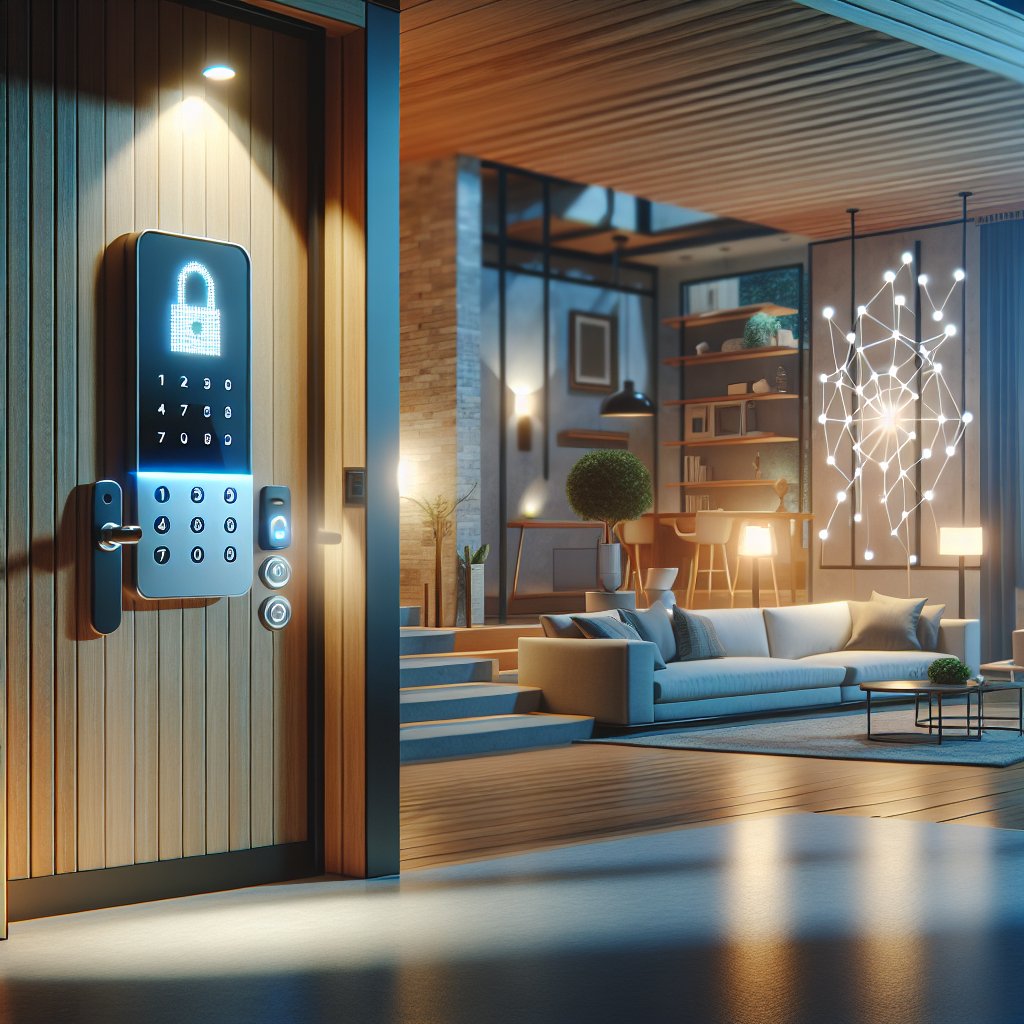The role of smart locks in modern home security is becoming increasingly significant as technology continues to evolve and integrate into our daily lives. These innovative devices not only enhance the security of our homes but also offer convenience and flexibility that traditional locks cannot match. In this article, we will explore the various aspects of smart locks, including their features, benefits, and potential drawbacks, as well as their impact on home security in general.
Understanding Smart Locks
Smart locks are electronic locking devices that allow users to secure and control access to their homes through various means, such as smartphones, key fobs, or biometric recognition. Unlike traditional locks that rely solely on physical keys, smart locks utilize advanced technology to provide a more versatile and user-friendly experience. They can be connected to home automation systems, enabling users to manage their locks remotely and integrate them with other smart home devices.
Types of Smart Locks
There are several types of smart locks available on the market, each offering unique features and functionalities. Understanding these types can help homeowners choose the right lock for their needs.
- Keypad Locks: These locks require a numerical code to unlock. Users can easily change the code as needed, making it a convenient option for families or short-term rentals.
- Bluetooth Locks: These locks connect to a smartphone via Bluetooth, allowing users to unlock their doors with a simple tap on their devices. They often come with additional features, such as temporary access codes for guests.
- Wi-Fi Locks: Wi-Fi-enabled locks can be controlled from anywhere with an internet connection. This allows homeowners to monitor and manage access remotely, making them ideal for those who travel frequently.
- Biometric Locks: These locks use fingerprint recognition or facial recognition technology to grant access. They offer a high level of security and eliminate the need for keys or codes.
Key Features of Smart Locks
Smart locks come equipped with a variety of features that enhance their functionality and security. Some of the most notable features include:
- Remote Access: Many smart locks allow users to lock or unlock their doors from anywhere using a smartphone app. This feature is particularly useful for granting access to visitors or service personnel when homeowners are away.
- Activity Monitoring: Smart locks often provide logs of who accessed the home and when. This feature can help homeowners keep track of visitors and enhance security.
- Integration with Smart Home Systems: Smart locks can be integrated with other smart home devices, such as security cameras and alarm systems, creating a comprehensive home security solution.
- Temporary Access Codes: Homeowners can create temporary access codes for guests, allowing them to enter the home without needing a physical key. This is especially useful for short-term rentals or when hosting visitors.
Benefits of Smart Locks
The adoption of smart locks offers numerous benefits that contribute to their growing popularity among homeowners. Here are some of the key advantages:
Enhanced Security
One of the primary reasons homeowners choose smart locks is the enhanced security they provide. Traditional locks can be picked or bumped, while smart locks often come with advanced encryption and security protocols that make unauthorized access more difficult. Additionally, features like activity monitoring and remote access allow homeowners to stay informed about who is entering their homes.
Convenience and Flexibility
Smart locks offer unparalleled convenience. Homeowners no longer need to fumble for keys or worry about losing them. With the ability to unlock doors using smartphones or biometric data, accessing the home becomes a seamless experience. Furthermore, the ability to grant temporary access codes means that homeowners can easily share access with friends, family, or service providers without the need for physical keys.
Integration with Smart Home Ecosystems
Smart locks can be integrated into broader smart home ecosystems, allowing for enhanced automation and control. For example, a smart lock can be programmed to automatically lock when the homeowner leaves the house or to unlock when they arrive home. This level of integration not only improves security but also enhances the overall convenience of managing a smart home.
Cost-Effectiveness
While the initial investment in smart locks may be higher than traditional locks, they can lead to long-term savings. For instance, homeowners can avoid the costs associated with rekeying locks when keys are lost or stolen. Additionally, the ability to monitor access can help prevent theft or unauthorized entry, potentially saving homeowners from costly losses.
Potential Drawbacks of Smart Locks
Despite their many advantages, smart locks are not without their drawbacks. Homeowners should consider these potential issues before making a purchase.
Dependence on Technology
Smart locks rely on technology, which can be a double-edged sword. If the power goes out or if there is a malfunction in the lock or the connected devices, homeowners may find themselves locked out of their homes. Additionally, if the smartphone app or the lock’s software is not updated regularly, it could lead to security vulnerabilities.
Cybersecurity Risks
As with any internet-connected device, smart locks are susceptible to hacking and cyberattacks. Homeowners must ensure that their smart locks are equipped with strong encryption and security features. Regularly updating passwords and firmware can help mitigate these risks, but it is essential to remain vigilant about potential threats.
Cost Considerations
While smart locks can save money in the long run, the initial cost can be a barrier for some homeowners. High-quality smart locks can be significantly more expensive than traditional locks, and additional costs may arise from installation or integration with other smart home devices.
The Future of Smart Locks in Home Security
The future of smart locks in home security looks promising as technology continues to advance. Innovations in artificial intelligence, machine learning, and biometric recognition are likely to enhance the capabilities of smart locks, making them even more secure and user-friendly.
Increased Adoption and Market Growth
As awareness of smart home technology grows, more homeowners are likely to adopt smart locks as part of their security solutions. The market for smart locks is expected to expand, with manufacturers continually developing new features and improving existing technologies. This growth will lead to increased competition, which may drive down prices and make smart locks more accessible to a broader audience.
Integration with Emerging Technologies
Future smart locks may integrate with emerging technologies such as voice recognition and artificial intelligence. This could allow for even more seamless access control, where users can unlock their doors simply by speaking a command. Additionally, advancements in machine learning could enable smart locks to learn user behavior and adapt to their preferences, further enhancing convenience and security.
Focus on Sustainability
As environmental concerns continue to rise, manufacturers may focus on creating smart locks that are more energy-efficient and sustainable. This could include the use of renewable energy sources for powering locks or the development of materials that have a lower environmental impact. Homeowners may increasingly seek out smart locks that align with their values regarding sustainability and eco-friendliness.
Conclusion
Smart locks play a crucial role in modern home security, offering enhanced protection, convenience, and integration with smart home systems. While they come with potential drawbacks, the benefits they provide make them an attractive option for many homeowners. As technology continues to evolve, smart locks are likely to become even more sophisticated, further solidifying their place in the future of home security. By understanding the features, benefits, and potential risks associated with smart locks, homeowners can make informed decisions about their security needs and embrace the advantages of this innovative technology.




